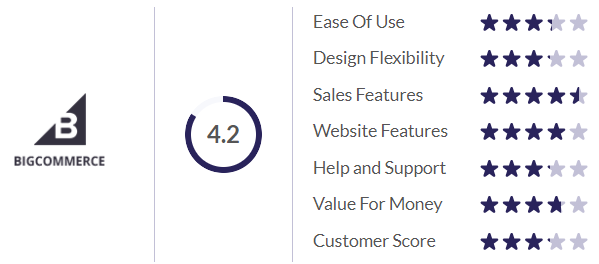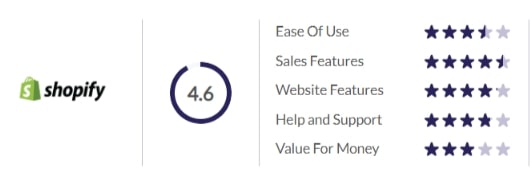Bigcommerce vs Shopify: The important differences you need to consider (2022)
BigCommerce vs Shopify are both powerful eCommerce site builders and online store managers, so they’re both great choices. That being said, there are a few key differences between the two platforms that can help you determine which is the ideal decision for you. Here, we’re going to compare BigCommerce vs Shopify and feature their vital distinction to assist with settling on your choice somewhat more straightforward. We look at customer support, pricing, ease of use, security,and marketing features – fundamentally everything that a person who’s planning to launch an eCommerce store would want to know.
BigCommerce vs Shopify – Overview

What is BigCommerce?
BigCommerce has become one of the quickest developing businesses in the eCommerce software market. Their clients range from startups setting up new online stores to high-profile companies such as Toyota, Bliss, DressUp,…
With BigCommerce, you can use attractive design tools to create creative and appealing store experiences and manage operational complexity with this secure and simple eCommerce platform. Also, BigCommerce helps outperform the competition by providing customers with quick shopping experiences that keep them coming back.
What is Shopify?
As for Shopify, the business was established in 2006. Shopify is a comprehensive commerce platform for starting, expanding, and managing a business. It handles both the eCommerce and point of sale aspects of the process.You don’t have to be an expert to start from scratch with it.
BigCommerce vs Shopify: Pros and Cons

Shopify or BigCommerce – The important differences you need to consider
Despite the fact that BigCommerce and Shopify are both fantastic platforms on their own, there are some differences that make one platform better suited to certain scenarios and types of users. Some expert reviews suggest that Shopify is the highest-rated platform, but Bigcommerce stands its own ground pretty good.
1. Pricing & Costs
When it comes to ecommerce website builders, the recurring monthly cost of a plan is the most important consideration for your budget. However, there will also be additional expenses, such as transaction and credit card fees. We’re going to cover monthly plan prices first, and then explain the additional costs you’ll meet with Shopify vs BigCommerce.
Both Shopify vs BigCommerce pricing plans offer free trials. They also have price plans ranging from around $29 to $299. However, there are a few pricing distinctions between BigCommerce and Shopify. Continue reading for more information!
BigCommerce Pricing & Costs
There are 4 BigCommerce pricing plans as follows:
- Standard: $29,95/month
- Plus: $79,95/month
- Pro: $299,95/month
- Enterprise: Pricing varies depending on requirements.
Importantly, BigCommerce pricing varies based on annual sales. As your business expands, this platform will upgrade your subscription plan for you automatically.

Shopify Pricing & Costs
While Shopify offers 5 pricing plans:
- Lite: $9/month
- Basic Shopify: $29/month
- Shopify: $79/month
- Advanced Shopify: $299/month
- Shopify Plus: Pricing varies depending on requirements.

These prices appear to be identical on the surface. However, when additional expenses are involved, this shifts. The types of features included in each plan are more important in determining the price difference between BigCommerce and Shopify.
2. Transaction Fees
Transaction fees are the proportion of each sale that they make. You’ll be happy to know that BigCommerce offers no transaction fees on any of its plans. Shopify, on the other hand, charges between 2% and 0.5%, depending on the pricing plan you choose. Shopify Payments (as opposed to third-party payment processors like PayPal) is the only method of avoiding the transaction fees charged by Shopify.
3. Customer support
 Whether you choose Shopify or BigCommerce, you’ll get access to similar options to discover when it comes to support. The options for support are as follows:
Whether you choose Shopify or BigCommerce, you’ll get access to similar options to discover when it comes to support. The options for support are as follows:
- 24/7 phone support
- 24/7 live chat
- Help center
- Support forum
- Video tutorials
- Advanced specialist support
Now, let’s compare BigCommerce and Shopify’s support a little more closely:
BigCommerce Support
Once you sign up for a free trial on BigCommerce, you’ll receive an appointment for a 10-minute call from this platform. By doing this, BigCommerce will have a better understanding of your company and will be able to offer better advice.
Besides, BigCommerce gives the enterprise-level plan enrollees top priority. You’ll avail of onboarding consultants and phone calls from highly skillful BigCommerce staff.
Shopify Support
Compared to Shopify’s, BigCommerce’s help center is useful but less clear.The various sections of Shopify are clearly and precisely separated.
In contrast to BigCommerce, Shopify’s customer service also provides assistance via social media. You are redirected to the appropriate page in the Shopify knowledge center whenever you request assistance within the Shopify editor. This is an excellent assistance feature and puts Shopify ahead of BigCommerce in this aspect.
4. Ease of use
Ease of use is important not only to beginners but even with experienced eCommerce entrepreneurs. As a result, this is an aspect that we’d love to take into consideration when comparing BigCommerce vs Shopify.
BigCommerce Ease of Use
Due to its use of various technical terms, BigCommerce is not ideal for beginners. Every time you perform simple tasks like adding a product,you may need to search for some of the specific terms to understand all the terminologies every time performing basic tasks. The technical load makes BigCommerce a heavier platform to deal with, however, this is because of its powerful in-built features, which brings you a finer level of customization.

Shopify Ease of Use
Anyone can easily launch an online retail store in a matter of minutes with the help of Shopify, and you do not need to be an expert in the field to do so.
Overall, Shopify outperforms BigCommerce in terms of ease of use. Shopify is commend by most users for its onboarding process and user-friendly editor. The left-hand main menu contains every necessary option, and a helpful wizard walks you through setting up your store step by step.

5. Payment Gateways
Basically, Shopify and BigCommerce are able to connect to almost all third-party gateways, including Paypal, Stripe, and Square…

Shopify Payments
Shopify Payment is the in-house payment provider dedicated to sellers on Shopify. Shopify Payment sends money directly to store owners whenever a customer makes a purchase. Besides, it includes a fraud analysis to identify any suspicious behavior. With Shopify Payments, buyers and sellers on Shopify can be sure of a quick, easy, and safe transaction.
BigCommerce Payments
Sadly, BigCommerce lacks a built-in payment processor, in contrast to Shopify. To get paid, store owners must connect their store to a third-party payment gateway.
6. ECommerce Dropshipping
The most important thing for drop shippers is to be able to quickly and easily get products from suppliers, add them to their store, and automate the selling and shipping process automated.
Shopify Dropshipping
In this regard, Shopify’s partnership with Oberlo and Dropified is its headline feature for drop shippers. For a wide range of products at wholesale prices, Oberlo is the go-to supplier. On the Shopify app market, numerous similar apps that target various niches, markets, or regions are available. Because of Shopify’s high curations criterions, they’re almost all highly rated and good at what they do.
BigCommerce Dropshipping
BigCommerce has a decent app marketplace, with a few great product sourcing apps. However, none of BigCommerce’s other apps are as well-known or comprehensive as Oberlo, and their quality varies greatly.
7. Marketing features
Marketing tools and functionalities come in handy when it comes to impellent your business. Let’s move to BigCommerce vs Shopify’s marketing features.

BigCommerce Marketing
Approaching customers through email marketing is a decent tactic to help you easily easily promote your products. Understand this point, BigCommerce allows you to sync your store data with prominent email marketing platforms like MailChimp, G Suite, and a few additional tools
Another important marketing feature is BigCommerce providing features that are in line with SEO best practices . This ensures industry-standard SEO which is built into all of the BigCommerce sites.
Shopify Marketing
On the other hand, Shopify email gives you built-in tools to build long-term relationships with customers. This platform gives you ready-made templates that you can use right away. You are even able to conduct and analyze all marketing activities within your dashboard.
8. Security
Ecommerce security is the guideline that ensures safe transactions through the internet.

Ecommerce site security is critical for a number of reasons. Exactly when it comes to protecting the privacy and responsive data of customers on a website, safeguarding the finances of an online business and defending the reputation of an online store as a safe place to conduct transactions.
BigCommerce Security
BigCommerce provides a secure shopping action for customers by keeping their security systems up to date with the best practices. In order to guard against breaches of credit card information, each server is PCI DSS level 1 certified. Additional security measures include perimeter and server-specific firewalls, file integrity scanners, intrusion detection software, 24/7 human monitoring, and fraudulent transaction protection provided. It’s safe to say that BigCommerce takes security very seriously and doesn’t do anything wrong.
Shopify Security
In a similar vein, Shopify stores are all PCI compliant by default to safeguard your company and customers. Thus, you can safeguard business and payment information.
Shopify provides SSL certificates will be issued to you after adding a custom domain. To ameliorate security, SSL certificates encrypt your store’s content and publish it securely using HTTPS instead of HTTP.
Final words
Both BigCommerce vs Shopify are excellent site builders and online managers and there’s a lot of overlap between the two. Overall, when comparing BigCommerce vs Shopify, it’s hard to pick winner. There are clearly some differences between the platforms that can help you differentiate between the two when you’re choosing which one to go with. The decision lies in your hands, hopefully, this article has given you enough information to help you choose the best platform that can cater to your business in the best ways.
If you are planning to migrate your platforms to BigCommerce or Shopify, ONEXT DIGITAL is willing to help your platform. As a reputable company in providing Web Development Services with superior quality to clients over the world, We make sure that we can be your reliable partner to create successful projects and help your business get your target rapidly.




